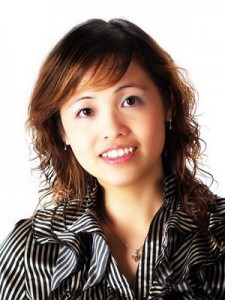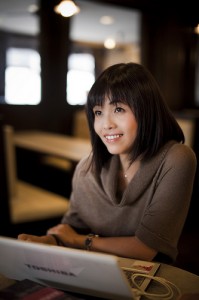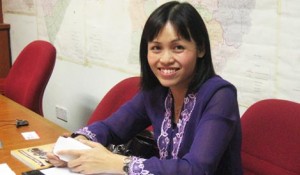Post-March 2008 a new political landscape has evolved, especially for women’s involvement in politics. Serdang Member of Parliament and DAP assistant publicity secretary Teo Nie Ching has experienced these changes firsthand, having been a beneficiary of this new wave in politics. Yet she also knows of the many challenges a woman elected representative faces in her quest to serve the constituents and the nation. She tells the Rocket’s T.K Tan why:
 What do women want, politically speaking? A loaded question for many perhaps, but Teo sees it with clarity.
What do women want, politically speaking? A loaded question for many perhaps, but Teo sees it with clarity.
“It depends on the women’s age and marital status. If they are before 30 years old and single, their concerns would centre on job opportunities and social mobility prospects,” Teo started.
“For the married ones, naturally their families and family-related issues would be their top concern. Quality education for their children, childcare amenities and related benefits, basic amenities and necessities comes to mind. But regardless of these different concerns, often the common worries are public safety and being treated with dignity at home and in the workplace. Domestic violence and rapes are tragically a frequent occurrence in Malaysia.”
Teo, a trained lawyer, states that the available forms of legal protection for and treatment of women in Malaysia are grossly insufficient. “As an example, sexual harassment; Malaysia has yet to enact a comprehensive sexual harassment legislation as of 2011. It is only covered in parts in the Penal Code, Employment Act 1955, and the Industrial Relations Act 1967,’ she remarked.
“Another aspect of legal neglect we can see is regarding job compensation, namely the concept of ‘equal job, equal pay’. Many would not dispute that women in Malaysia do most of the hard work, yet get paid less compared with their male counterparts. This ‘equal pay for work of equal value by women’ concept has been practised in the UK since 1970. Unfortunately for us, Malaysia has yet to even consider enacting it,” Teo expounded.
The Malaysian public childcare amenities and facilities are mostly non-existent. Some studies have shown that many women after age 35 and married with children tend to drop out from the workforce. “They are forced to retire to take care of their children. Not many of us can afford to hire domestic maids to take care of the children.” Indeed, the proverbial glass ceiling adage for women in workplace is self-imposed as much as it is external imposition.
Malaysia’s women employment participation rate, currently at 46 percent, is relatively low compared with some of its neighbours such as Thailand (70 percent) and Singapore (56 percent). An 2010 UNDP Asia Pacific Human Development report on gender equality reported that if Malaysia can increase its female labour participation rate to 70 percent, the country could potentially see a 2.9 percent increase in annual GDP growth rates.
“If Malaysia can increase its female workforce participation, the country’s economic growth can be increased substantially. It would help to improve the people’ living standards. However, the current macro environment is not conducive for more women to work in,” she elaborated.
Getting Their Attention
Politics, being a direct avenue to affect changes for women, has proven to be a bane for meaningful female participation. Female representation in politics in Malaysia is low. Currently there are 24 women Member of Parliaments (MP), around 11 percent of the total number of MPs. As a result many of the women and gender-related legislations are put on the backburner.
The general perception that politics is dirty and it’s a men’s playing field is unfortunately entrenched in many women’s thinking. Teo believes women in Malaysia need to change their preconceived mindsets and rise up to the political challenge to speak up for women issues and formulate policies and legislation of this country that will better address women-related issues.
“Post 2008, the younger generation of women are generally enthusiastic about politics and its workings. However, the older womenfolk have yet to engage politics deeply. The housewives may talk more about politics now; however it’s quite another of matter for them to volunteer for political work. For most, their families are still their main concerns,” she stated.
“Herein lays our challenge: raising the women’s political interest that will eventually lead to a bigger pool of political workers and qualified candidates. We have attempted to recruit more suitable candidates in our contact loops. Malaysian women are definitely not less qualified or educated than the men. However the women need to demonstrate the willingness to take up this challenge to serve the country.”
She believes that the general Malaysian political environment and its working culture generally favour men. “Many of the meet-the-people events take place at night, making it difficult for women politicians who have families to attend frequently. However, societal norms are changing; many women will not put up with their husbands being on late nights out too often; the elected representatives (YBs) will be expected to be home early, whether male or female.”
For Women’s Sake
 To address the deficiency of women representation in politics in Malaysia, what can Pakatan Rakyat (PR) do to attract women to politics? For starters, PR has to set the example to attract the women’s attention. In this aspect, Teo believes PR has performed relatively well.
To address the deficiency of women representation in politics in Malaysia, what can Pakatan Rakyat (PR) do to attract women to politics? For starters, PR has to set the example to attract the women’s attention. In this aspect, Teo believes PR has performed relatively well.
“Despite our lack of numbers, in these short three years, we have fought incessantly for reforms such as amendments for the Law Reform (Marriage and Divorce) Act. Under the current act, which regulates maintenance payment for the children of the divorced couple, the father is only obligated to pay maintenance for the children till he or she is 18 years old. This is unjust; most children at this age have just entered into their tertiary studies and in need of more support from their parents,” she continued.
“Together with many women NGOs, we have been pushing for these maintenance payments to be extended to the completion of the children tertiary studies duration for more than a decade. However, there has been much resistance from the government,” she lamented.
“Overall, PR women MPs have done a better job vis-à-vis the BN’s women MPs. Reputation and image-wise, we have better standing; at least we don’t have to contend with cyanide mining and cows-and-condominium scandals. The PR component parties’ leaders are more willing to field highly qualified female candidates for elections. The same can’t be said for BN; most BN’s component parties work in a highly structured and hierarchical way; hence lest chances for any new star to shine.”
“DAP is a good example. I joined DAP in January 2008, assisting DAP party work in Selangor. Just before the general elections (GE) I was sent to contest in Serdang where I was not a member. The branch members there received me well; with their assistance I was able to win handily as a result.
Enlarging The Pool
When asked if the candidate pool can be further enlarged beyond the traditional confines of active professionals and businesspeople, Teo believes PR can be creative.
“In Penang, we have the example of Berapit ADUN and Penang state government exco Lydia Ong. She was a professional who retired from active employment in her prime to take care of her family. But she was perturbed by Malaysia’s worsening public safety situation; children and women being raped and assaulted without adequate legal protection and redress.”
“She came out of retirement to join the cause. Today she is serving tirelessly for her constituents and Penang. Yes, we need more of her type of women who would answer the call for change.”
As to whether the support for women YBs in DAP is adequate, Teo doesn’t believe the women have been singled out for special assistance. “I can get help easily as the senior MPs and party leaders generally take care of the MPs. The leadership in DAP practices the culture of helping out their MPs.”
Empowering women – PR’s record
 Overall, Teo believes PR has done better than BN too in promoting women to leadership roles. She cites a few of the more prominent examples: “There are four women executive councillors (excos) in Selangor and two women helming both local councils in Penang. This is unprecedented for Malaysia,” she beamed.
Overall, Teo believes PR has done better than BN too in promoting women to leadership roles. She cites a few of the more prominent examples: “There are four women executive councillors (excos) in Selangor and two women helming both local councils in Penang. This is unprecedented for Malaysia,” she beamed.
“As for other practical concerns, Selangor PR state government has introduced the free mammogram programme for women. Every month the state government will provide transportation for the women to the designated medical centre for the breast cancer check up,” Teo continues.
“Mammograms can be a costly affair in private medical centres; we hope this will address some of the issues closer to heart for the womenfolk in the state.” (refer to Gender Friendly Steps)
However she cautions against undue expectations by the electorate. “Admittedly, more can be done to empower the womenfolk. However, with the current legislative structure being heavily skewed to the parliament’s control, it will be difficult to enact any binding legislation in PR-run states.”
“The steps taken are within the ambit of the state government’s power and ability. Through these steps we hope to create more public awareness of the gender equality issues at stake and what PR can do if it comes to power at the federal level.”
Improving PR’s appeal
In an alternative media news report released in November 2011, it was reported that a recent poll shows 56 percent of the Malaysian female voters preferred BN now. Is this indicative of the national state of affairs? What does PR need to do to arrest this decline?
“PR’s promotional and publicity efforts are not reaching the adequate mass effectively. Admittedly we have an urban-rural information access divide. Take for example Selangor. Most of the state’s urban residents seem to have some exposure to the Selangor state government’s Making Selangor Economy People First (MES) programmes.”
“However, in the rural areas news on PR’s achievements are limited. We don’t have an adequate access to the Malay mainstream newspapers, which is often the only news mainstay for the kampong folks. Even many of those who surfed on the internet are not necessarily regular follower of political news. We need to do a better job at spreading the information,” she elaborated.
Particularly for Selangor, she cautioned that publicity efforts are still not up to the mark yet. “Many voters who follow the general political currents outside of Selangor know more about what Penang PR is doing.”
Teo believes PR should do more distinctive and concerted efforts at reaching out to the womenfolk. “We can do more of specially catered, smaller scale meet-the-people sessions such as tea with women, women speakers-only ceramahs, etc. The key is to ensure the attendees get the proper message from us,” she opined.
Is the current PR womens’ wing cooperation and abilities at the optimal level or able to counter BN’s machinery? “We are definitely nowhere close to matching BN’s strength yet in this area.”
However, Teo believes that as DAP is generally an urban and issues-based party, reaching out to the women voters is not as daunting task as it contest mostly in the urban area seats. But the need for cooperation in this area cannot be downplayed. “In my Serdang constituency, there are pockets of Malay kampongs which I have to cooperate closely with the PAS Dewan Muslimat to reach out to the reclusive Malay female voters.”
“Many Malay women voters are more comfortable with individual outreach. We need to work closely with PAS and PKR on increasing our presence in the Malay women’s area.” -The Rocket



